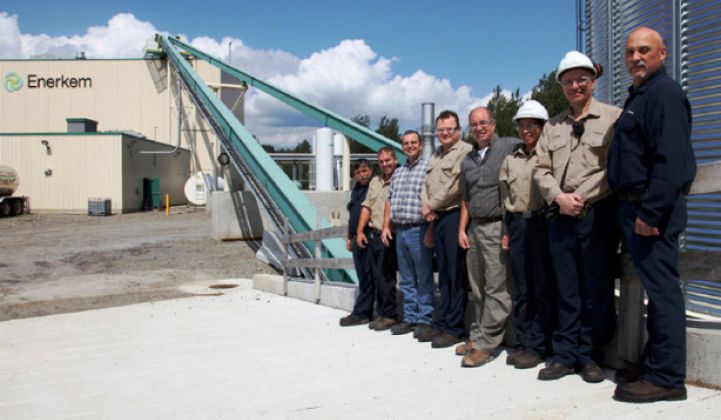Are commercial biofuels created from zero-cost waste feedstock a pipe dream? That answer was nudged a little farther toward “no” today after trash-to-biofuel firm Enerkem filed its Form F-1 with the SEC in preparation for a $125 million IPO. The company's riding a wave of biofuel offerings that just doesn't seem to be slowing down.
The Canadian company was founded in 2000, and has developed a “proprietary thermochemical technology” platform to process municipal solid waste (MSW) -- otherwise known as plain old trash -- into syngas, which can then be converted into methanol and then ethanol, or other chemical intermediates. Sounds like fellow biofuel aspirant Fulcrum, doesn't it?
Enerkem's platform can apparently accept nearly anything, including “mixed textiles, plastics, fibers, and wood.” The company also claims that its gasification process has lower operating and capital costs than syngas competitors “due to lower temperature, pressure and energy requirements to break down heterogeneous waste feedstock.”
Enerkem says it has validated its technology over the course of its 10-year operating history, first at a small-scale (4.8 metric tons per day) pilot plant and later at a commercial demonstration facility that's currently processing ten times that amount. The glaring issue is that Enerkem has yet to convert methanol to ethanol at its demo plant. It's not exactly a difficult process, but the fact that the company is waiting for a full-scale plant to do so could lead to production and logistical problems.
Of course, that's only a commercial demo plant. Enerkem is still in the development stage and has yet to generate any significant revenue. That may change soon: Enerkem is currently building a 10-million-gallon-per-year plant in Edmonton, and has already secured a 25-year MSW feedstock supply agreement with the City of Edmonton.
The company claims that facility, with seven times more production than its demo plant, will have the lowest scale-up to full commercial capacity to date of any cellulosic ethanol producer, which helps mitigate ramp-up problems that can plague a firm's projections.
In addition, Enerkem has a pair of 10-million-gallon-per-year plants of the same design being developed in Pontotoc, Mississippi and Varennes, Quebec, Canada. On top of those facilities, Enerkem is negotiating non-binding agreements to sell its proprietary systems to two of its strategic shareholders, Waste Management of Canada and Valero.
Let's have a quick look at the numbers, remembering that because Enerkem is Canadian, the company's F-1 financials are all listed in Canadian dollars. (If you don't mind rough numbers, the U.S.-Canada exchange rate has held at nearly 1:1 for the past two years.)
- As of September 2011, Enerkem had C$55.5 million in cash, with total capitalization at C$111.4 million.
- Through the first nine months of 2011, total income stood at C$887,000, with no revenue. Total income in 2010 was C$2.8 million, with C$443,000 in revenue.
- Net loss through September 2011 was C$19.1 million, after a loss of C$11.9 million in 2010.
- At 10 million gallons per year, Enerkem thinks it can produce ethanol at $1.50 to $1.70 per gallon.
- Enerkem's most recent round of fundraising netted $30 million.
Additionally, the firm expects to receive payments for accepting trash, known as tipping fees. Enerkem cites an industry publication in saying landfill tipping fees were $47 per metric ton in 2009. The firm says every $10.00 per ton worth of tipping fees it gets will generate revenue of $0.12 per gallon.
According to Enerkem, there are 140 million metric tons of waste produced in the U.S. every year that are suitable for its platform. At its target of 100 gallons of ethanol per metric ton of sorted waste, that's enough headroom for 14 billion gallons of ethanol production a year.
As a result, the note Enerkem is trying to play up is the fact that its platform puts trash to use. According to the F-1, the U.S. generated a total of 435 million metric tons of MSW in 2009, two-thirds of which was sent to landfills. Landfill space is fast disappearing, with projections from 2009 stating the U.S. has 19 years' worth of capacity left.
That makes trash-to-biofuel systems all the more appealing, especially if tipping fees go up as a result. Of course, the process has to work. It's tough to tell just what will happen when Enerkem goes commercial, especially considering the company is not even producing ethanol right now, but the fact that it's looking at a 7X scale-up does help a bit.
It all comes down to a familiar story with biofuel IPOs as of late: If Enerkem hits its projections, it has an interesting model in a sector that's not extremely populated.
But right now, that's still a big “if.”



